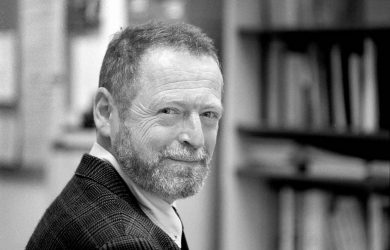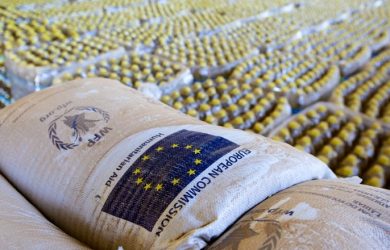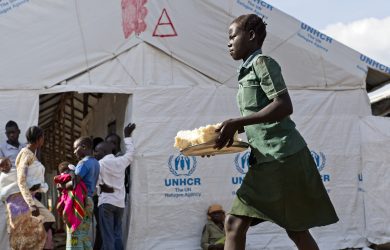- ABOUT US
- RESEARCH
- EDUCATION
- The Graduate School
- PhD Programme
- MSc Programmes
- Capacity Development
- News
- Design and Evaluation of Public Policies (DEPP)
- Design and Evaluation of Innovation Policies (DEIP)
- Evidence-Based Policy Research Methods (EPRM)
- Migration Management Diploma Programme (MMDP)
- Moving the Migration Policy Agenda Forward (MMPAF)
- Online Courses
- Short Courses (Masters)
- Tailor-made programmes
- UNU-MERIT, ITU Academy Training Centre
- Alumni
- Academic Funding
- NEWS
- EVENTS
- PUBLICATIONS
- LIBRARY
Podcast: UNDP director Pedro Conceição shares key findings of new Human Development Report
02 July 2024
The Director of the Human Development Report Office at the United Nations Development Programme, Dr Pedro Conceição, tells UNU-MERIT about the current challenges and opportunities for progress in human development The Human Development Reports are a long-running series of publications from the United Nations Development Programme (UNDP) that have been informing global development discussions since 1990, each one focused on different themes and aspects of human development that are relevan...
Continue Reading →How to start a career at a multilateral development bank
11 October 2023
Tips and tricks from our dual career PhD fellows To kick off the 2023–2024 academic year, three of our dual career PhD fellows – Ari Perdana, Ilsa Meidina and Laisa Daza Obando – held a panel discussion about careers in multilateral development banks, describing their personal experiences of working in these organisations and offering advice for those wanting to enter the field. Here’s a short summary of what they had to share. What are multilateral development banks (MDBs) and what do they do? ...
Continue Reading →Are emerging economies already engaging with Industry 4.0 technologies?
03 August 2022
This article is republished from Development Matters. Read the original article here. A joint post By Michele Delera, Prof Carlo Pietrobelli, UNU-MERIT , and Elisa Calza and Dr Alejandro Lavopa, UNIDO[1] There are many controversies among economists but one fact is undisputed: long-run productivity growth depends on the absorption and deployment of new technologies. Some estimates indicate that differences in technology diffusion account for a quarter of cross-country differences in per capita i...
Continue Reading →Nigeria has democracy but not development: Book review
23 August 2021
After struggling for 39 years to develop a fertile ground for democratic governance, Nigeria had its turning point in May 1999 when it became the world’s fourth largest democracy. This came after 16 years of brutal military rule. Despite complaints of fraud by political opposition in each election held since 1999, local and international election observers have regarded each of Nigeria’s general elections as relatively free and fair. On the economic front, Nigeria is now the largest economy in A...
Continue Reading →In Memoriam: Adam (Eddy) Szirmai
14 January 2020
It is with great sadness that we bring the news that our good friend and colleague Eddy (Adam) Szirmai passed away early last Saturday, 11 January 2020. Eddy was recovering from extensive surgery that he underwent more than a year ago, and although the treatment was generally considered successful, severe complications arose at the end of last year. Eddy was a true intellectual, born in an immigrant family with strong intellectual roots. During the 1960s and 1970s, he studied economics, history,...
Continue Reading →Throwing development money at the ‘migration problem’ – is it completely misguided?
20 November 2019
There is very little evidence that development aid and interventions affect migration decisions. The evidence we do have is mixed and often shows the opposite of the intended consequence. What does this mean for policymakers?...
Continue Reading →Social protection and bridging the humanitarian-development divide
22 August 2018
In light of the World Humanitarian Day last Sunday, August 19, this post argues for the need to revisit humanitarian aid and place it alongside social protection. Recognising that over 140 million people relied on humanitarian aid across 37 countries in 2017, there is an urgent need to take up the discussion and look towards the delivery mechanisms of social protection that allow for more long-term development....
Continue Reading →Foreign doctorates are attractive — but don’t write off homegrown PhDs
26 June 2018
Introducing more skilled employees into the economy is an important path to development for many middle income countries. That’s why increased and improved training at the top end of the education level – PhDs – is considered so vital. Many countries encourage students to pursue their PhDs abroad in nations with well-ranked universities, particularly in Europe and North America, on the presumption that what’s offered in the developed world is better quality. They know that some of those students...
Continue Reading →Migrants’ Rights & Development: New Report
26 May 2017
Researcher Elaine McGregor recently authored the second edition of the ‘MOVEMENT Report: A Global Civil Society Report on Progress and Impact for Migrants’ Rights and Development. She also wrote the first edition. Diego Salama caught up with her to find out more. The full report is embedded below or available here. What did the first edition focus on? At the global policy level there is an annual meeting of the Global Forum on Migration and Development (GFMD) which rotates, every year, fro...
Continue Reading →Paradoxes in Higher Education: Luc Soete at UNU HQ
12 December 2016
On 14 December 2016, UNU HQ in Tokyo hosted ‘Paradoxes in Higher Education‘, a conversation with Professor Luc Soete, Chairman of the EU Research, Innovation, and Science Policy Experts High Level Group and former Director of UNU-MERIT. Investments in education are essential for the sustainable growth and development of a country. But are governments making the right decisions regarding their educational investments? One of the paradoxes of higher education is that in developed count...
Continue Reading →Archives
Contact
UNU-MERIT
Boschstraat 24
6211 AX Maastricht
The Netherlands
T: +31 43 388 44 00
Email: info@merit.unu.edu
Boschstraat 24
6211 AX Maastricht
The Netherlands
T: +31 43 388 44 00
Email: info@merit.unu.edu
Partner sites
Newsletters
© 2024 UNU-MERIT | Maastricht University













